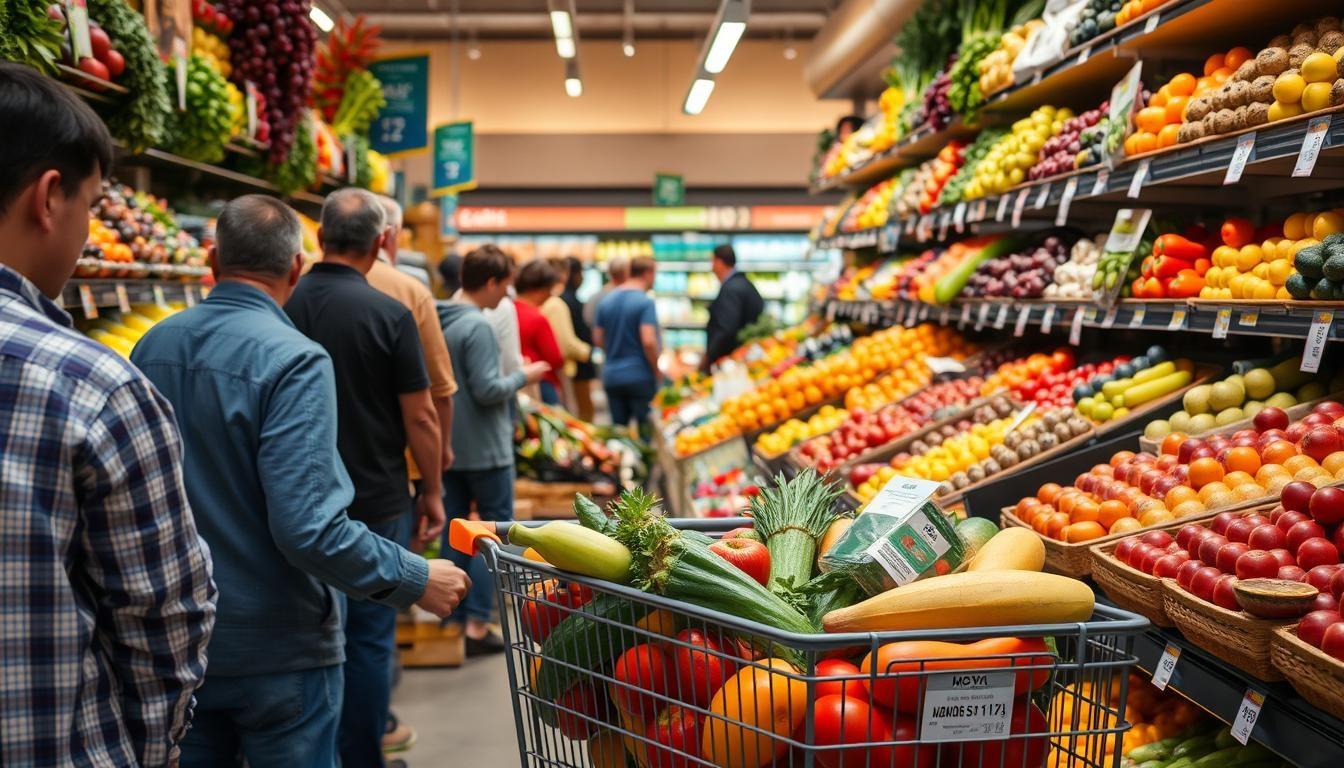Grocery shopping can be a big expense for many families. But, with smart strategies, you can save money without losing quality or taste. This article will share practical tips to help you shop smarter and stretch your budget.
Key Takeaways
- Plan your meals and make a detailed shopping list to avoid buying things you don’t need and reduce waste.
- Buy in bulk for non-perishable items to save money over time.
- Check out discount stores and compare prices to find the best deals on your favorite items.
- Use coupons, loyalty programs, and seasonal produce to save more.
- Choose to cook at home and prep meals to save money and stay healthy.
Plan Your Meals and Make a Shopping List
Planning meals and making a detailed grocery list can cut down on waste and impulse buys. This saves you money. We’ll look at tips for meal planning and how to make a complete shopping list. This way, you only buy what you need.
Meal Planning Tips
Meal planning is key for smart shopping and saving. Start by checking what you already have in your pantry and fridge. This helps you avoid buying the same things twice and use up items before they go bad. Next, plan your meals for the week, thinking about your schedule and what you like. Batch cooking and making meals ahead of time can save you time and money.
- Make a weekly meal plan and stick to it
- Consider your schedule and choose meals that fit your lifestyle
- Utilize leftovers and batch cooking to minimize food waste
Creating a Grocery List
After planning your meals, it’s time to make a detailed grocery list. A well-organized list helps you stay focused and avoid impulse buys during your shopping trip. Organize your list by store sections, like produce, dairy, and canned goods. Always check your pantry and fridge before shopping to avoid buying things you already have.
- Categorize your list by store sections for easy navigation
- Check your pantry and refrigerator to avoid duplicate purchases
- Stick to your list and avoid impulse buys
By planning your meals and making a detailed grocery list, you’re on your way to smart shopping. This will help you save money on your weekly expenses.
Buy in Bulk When Possible
Smart shoppers save a lot by buying in bulk. This is especially true for non-perishable items and household basics. Buying more at warehouse clubs or wholesale groceries can stretch your budget. But, only buy what you’ll use before it goes bad.
Here are some tips for figuring out what to buy in bulk:
- Non-perishable foods like grains, pasta, canned goods, and spices
- Household cleaners, paper products, and personal care items
- Frozen fruits and vegetables (when buying in bulk, look for sales or coupons to maximize savings)
- Bulk snacks and baking supplies (flour, sugar, chocolate chips, etc.)
When you shop at warehouse clubs or wholesale grocers, check the unit price. The bigger size might not always be cheaper. Always compare prices to make sure you’re saving money.
| Item | Bulk Price | Regular Price | Savings |
|---|---|---|---|
| Laundry Detergent (100 oz) | $15.99 | $22.99 | 30% |
| Canned Diced Tomatoes (28 oz, 6-pack) | $8.49 | $12.99 | 35% |
| Frozen Broccoli (5 lb) | $9.99 | $15.99 | 38% |
By smartly adding bulk shopping to your routine, you can save a lot. You won’t have to give up quality or variety.
Shop at Discount Grocery Stores
Savvy shoppers know that finding the best deals on groceries is key to staying within a tight budget. One effective way to achieve significant savings is by exploring discount grocery stores. These establishments offer a wide range of products at prices that can be significantly lower than traditional supermarkets.
Finding the Best Deals
To uncover the most lucrative discount grocery deals, it’s essential to do your research. Start by scouring online reviews and local directories to identify the top-rated discount stores in your area. Pay attention to customer feedback on product quality, store cleanliness, and overall shopping experience to ensure you’re selecting a reputable establishment.
Once you’ve identified a few promising options, make a point to visit these stores in person. Take the time to browse the aisles and compare prices on your regularly purchased items. Keep an eye out for limited-time promotions, bulk discounts, and clearance sections where you can find even deeper savings.
Comparing Prices
Comparing prices across different retailers is a crucial step in maximizing your savings when budget grocery shopping. Before heading to the checkout, take a moment to jot down the prices of your key items at the discount grocery store. Then, compare these prices to what you would typically pay at your regular supermarket or online retailers.
By keeping a price log, you’ll be able to identify the specific products that offer the most significant savings at the discount store. This information can then guide your future shopping trips, ensuring you continue to get the best possible deals on the items you need most.
| Product | Discount Grocery Store Price | Regular Grocery Store Price | Savings |
|---|---|---|---|
| Whole Wheat Bread | $2.49 | $3.99 | $1.50 |
| Organic Chicken Breasts | $4.99/lb | $6.99/lb | $2.00/lb |
| Canned Tomatoes | $0.79 | $1.29 | $0.50 |
By taking the time to explore discount grocery stores and compare prices, you can unlock significant savings on your weekly grocery bill. With a little effort and strategic shopping, you’ll be well on your way to becoming a savvy budget grocery shopper.
Stick to a Budget
Keeping a grocery budget is key to saving money. By setting a realistic budget, you can control your spending. Here are some tips to help you stay on track.
Budgeting Strategies
Start by tracking your spending. Look at your past grocery receipts and sort your expenses. This helps you see where your money goes and where you can save.
Then, set a budget based on your spending and goals. Remember to include extra costs like guests or special diets. Try to stick to your budget and adjust as needed.
Planning your meals and making a shopping list is another smart move. It stops impulse buys and ensures you only buy what you need. This saves money and reduces waste.
| Budgeting Tip | Benefits |
|---|---|
| Track your grocery spending | Gain visibility into your spending patterns and identify areas for improvement |
| Set a realistic grocery budget | Establish a spending limit to keep your grocery budget in check |
| Plan your meals and make a shopping list | Avoid impulse purchases and reduce food waste |
Using these strategies, you can manage your grocery expenses and save on groceries. It might be hard at first, but with time, it becomes easier. Sticking to a budget helps you manage your grocery budget well.
Use Coupons and Loyalty Cards
Coupons and loyalty programs can help you save money on groceries. They offer great grocery savings and rewards for every purchase.
Look for grocery coupons in newspapers, online, and from brands. Keep them organized to use them on your next trip.
Joining loyalty programs at your local stores can give you more discounts and rewards. You earn points or cash-back that you can use later.
| Coupon Benefits | Loyalty Program Benefits |
|---|---|
|
|
Using both coupons and loyalty programs can save you a lot on groceries. Check out what’s available in your area and use these tips to save money.
Buy Seasonal Produce
Buying seasonal produce is a great way to save money and get the best taste. It lets you enjoy the freshest fruits and veggies. You get to enjoy the best quality fresh produce by shopping when it’s in season.
Benefits of Seasonal Produce
There are many good reasons to eat seasonal produce:
- Improved Taste and Nutrition: Seasonal produce is picked at the best time. It tastes better and is more nutritious than out-of-season options.
- Buying local supports your community and cuts down on environmental harm from long transport.
- Cost Savings: When fruits and veggies are in season, they’re cheaper. This helps you spend less on food.
- Variety and Inspiration: Trying seasonal produce opens you up to new foods. It sparks creativity in the kitchen.
| Season | Seasonal Produce Examples |
|---|---|
| Spring | Asparagus, Strawberries, Rhubarb, Artichokes |
| Summer | Corn, Tomatoes, Peaches, Watermelon |
| Fall | Apples, Pumpkins, Squash, Brussels Sprouts |
| Winter | Citrus Fruits, Potatoes, Broccoli, Cauliflower |
Shopping for seasonal produce all year has many benefits. You get fresh, tasty, and affordable fruits and veggies.
Cook at Home More Often
Cooking at home can save you money on food. It helps you avoid expensive dining out or takeout. We’ll share some meal prep ideas to help you cook more at home.
Meal Prep Ideas
Planning and preparing meals in advance is key. Here are some tips for meal prepping:
- Choose healthy, affordable recipes you like and can make in bulk.
- Set aside a few hours on the weekend to cook several meals at once. This could be baked chicken, roasted veggies, or stews.
- Put your meals in individual containers or portions for easy access during the week.
- Freeze leftovers for quick reheats on busy days, ensuring you always have a home-cooked meal.
- Try slow cooker or Instant Pot recipes for easy prep and tasty dishes.
By planning and preparing meals, you can cut down on dining out costs. You’ll also enjoy nutritious, home-cooked meals.
“Cooking at home is not only healthier, but it can also save you a lot of money in the long run.”
Success in meal prepping comes from choosing recipes you love and that fit your budget. With some planning, you can save a lot on your grocery bill.
Freeze and Preserve Food
Proper food preservation can change the game for your grocery savings and reducing waste. Freezing and preserving different items can save you money and keep food fresh longer. This way, you get to enjoy your favorite foods for a longer time.
Freezing is a top way to keep food fresh longer. It works for meats, veggies, baked goods, and leftovers. Learning how to freeze food right helps keep its taste and nutrients, letting you enjoy it even after it’s been bought.
Other great ways to preserve food include canning, pickling, and dehydrating. These methods are perfect for using up seasonal produce, buying in bulk, and dealing with leftovers. Mastering these techniques can lead to big savings on your grocery bill and a greener lifestyle.
FAQ
What are some effective meal planning tips?
To plan meals well, start by making a weekly or monthly plan. This helps avoid last-minute choices. Include leftovers and versatile ingredients in your plan.
Think about your family’s likes and schedule when planning. Also, batch cook or prep ingredients ahead of time to save time during the week.
How can I create a useful grocery list?
To make a good grocery list, first check what you already have. This avoids buying duplicates. Group items by category to make shopping easier.
Remember any special meals or events that need specific ingredients. Leave some space on your list for things you might forget or find in the store.
What are the benefits of buying in bulk?
Buying in bulk has many benefits. You get lower prices on non-perishable items and household essentials. It also means less packaging and waste.
Stocking up on things you use a lot can save time. You won’t have to shop as often.
How can I find the best deals at discount grocery stores?
To find the best deals, compare prices at different discount stores. Look for store-brand or generic options, which are often cheaper.
Check for clearance sections and end-of-aisle displays for unadvertised discounts. Sign up for loyalty programs to get exclusive member savings.
What are some effective budgeting strategies for grocery shopping?
To stick to a budget, set a realistic monthly or weekly amount. Track your spending to find areas to cut back. Prioritize what you need and limit what you don’t.
Avoid impulse buys by sticking to your list. This helps you stay on track and save money.
How can I maximize my savings using coupons and loyalty programs?
To save with coupons and loyalty programs, start by looking for coupons online or in newspapers. Combine them with sales for the biggest savings.
Sign up for loyalty cards for exclusive deals. Use loyalty points or rewards to pay for future grocery trips.
What are the benefits of buying seasonal produce?
Buying seasonal produce has many benefits. It’s often cheaper because there’s more of it. It’s fresher and tastes better.
It’s also better for the environment because it travels shorter distances. You get to try more fruits and vegetables throughout the year.
How can I save money by cooking at home more often?
Cooking at home saves money in several ways. It cuts down on dining out or takeout costs. You can control how much you eat and what ingredients you use.
It lets you prep meals and use leftovers. This encourages using more affordable, whole foods.
What are some effective ways to freeze and preserve food?
To save money and reduce waste, freeze and preserve food properly. Store frozen items correctly and label them. Use freezer-safe containers or bags to prevent freezer burn.
Try canning, dehydrating, or pickling for non-perishable items. Learn the best storage methods for different foods and produce.
Also Read: Personal Finance: Budgeting Tips and Tools for Success




